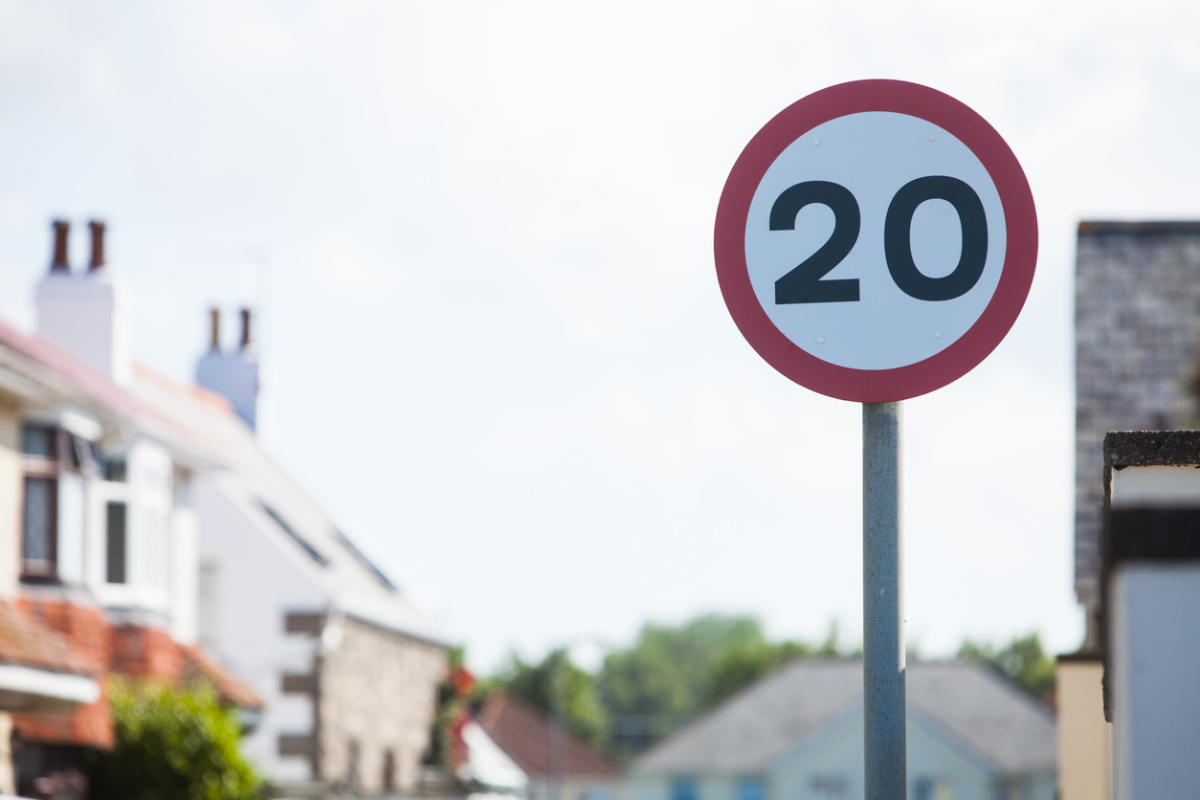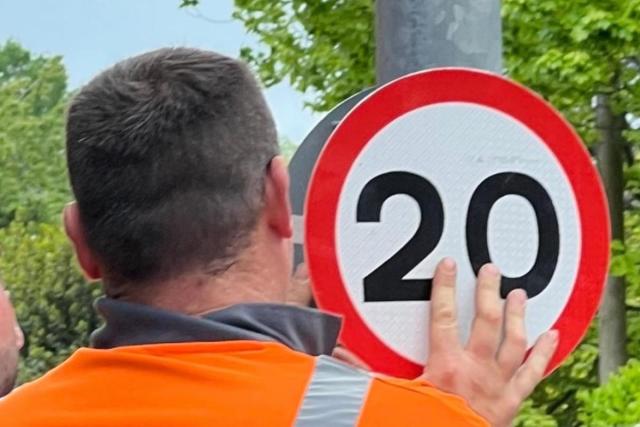News
Wales’ 20mph speed limit now in force amid much controversy

FROM Today (Sunday, Sept 17), the vast majority of residential roads across Wales will see a new speed limit of 20mph, a decision that has sparked extensive debate.
The Labour-led Welsh government has championed this initiative, suggesting that this would lead to a significant reduction in road accidents, saving both lives and NHS resources. They also believe such a move will make communities more pleasant to inhabit and work.
However, the decision has its critics. The Conservative party warns that the new limit could adversely impact the Welsh economy to the tune of billions. Natasha Asghar, the Welsh shadow transport minister, has branded the rollout as “madcap” and “ludicrous”, sentiments echoed by Penny Mordaunt, the leader of the House of Commons.
The RAC has issued a warning to drivers to be extra vigilant, especially this Sunday. Simon Williams, the motoring group’s head of policy, has highlighted potential pitfalls in satnav systems which may not reflect the recent updates.
Welsh Labour’s commitment to this policy can be traced back to their manifesto during the 2021 Senedd election. Despite the popularity of the party during the elections, a recent petition opposing the 20mph limit has amassed 70,000 signatures. There have also been incidents of newly erected 20mph signs being vandalised throughout the region.
Welsh First Minister, Mark Drakeford, acknowledges the controversy, stating that there will be a “period of turbulence” post-implementation. However, he remains confident that the public will eventually see the value and logic behind the policy.

What’s Driving the Change? Globally, evidence suggests that lowering speed limits can result in a significant reduction in collisions. The Welsh government projects a potential decrease of 40% in collisions, saving up to 10 lives and preventing up to 2,000 injuries annually. The transition aims to encourage walking and cycling, which would in turn, reduce car pollution.
Which Areas are Affected? Primarily, roads that currently have a 30mph limit will see the change to 20mph. However, local authorities retain the discretion to keep certain roads at the current speed limit.
The Economic Debate While opponents cite a staggering £4.5bn potential economic loss from the scheme, this figure, sourced from a Welsh government report, spans over 30 years. The Welsh government emphasises that the cost of rolling out the 20mph limit is £32m, which could be swiftly offset by saving the NHS an estimated £92m annually.
Trials and Reactions Eight trial areas saw varied responses. In St Brides Major, south Wales, the results seem positive. Yet, in Buckley, north Wales, there has been substantial opposition.
Enforcement Measures The police will primarily enforce the new speed limit. Interestingly, there will also be involvement from the firefighters’ road safety team, though this decision hasn’t been without its criticisms.
A Global Trend? Spain saw the introduction of a similar limit in 2021, which led to a 13% decrease in pedestrian deaths in specific areas. Despite some opposition in the UK, many British cities have adopted 20mph zones. Notably, Portsmouth, represented by Penny Mordaunt, was among the pioneers of this movement.
For now, the eyes of the UK will be on Wales, watching the outcomes and possible ripple effects of this decisive move.
LIVING STREETS CYMRU
Living Streets Cymru, part of the UK charity for everyday walking, is celebrating new legislation to reduce speed limits in Wales.
From today (17 September 2023), Wales will become the first UK nation to adopt a 20mph default speed limit on residential streets.
The new legislation means that most roads that currently operate as 30mph areas will reduce to 20mph. It is estimated that the move will save 6-10 lives every year, result in 40% fewer collisions and prevent up to 2,000 people being injured.
Research shows that setting the default speed limit at 20mph in residential roads in Wales will reduce pressure on the NHS from a reduction in injuries from road traffic collisions and save £92m each year.
In 2019, Spain reduced the speed limit to 30km/h (18.64mph) on the majority of its roads. Since then, there have been 20% fewer urban road deaths, with fatalities reduced by 34% for cyclists and 24% for pedestrians.
Stephen Edwards, Chief Executive, Living Streets said: “Introducing 20mph as the default speed on our residential streets will improve the places where we live, work and go to school.
“When someone is hit at 30mph, they are around five times more likely to be killed than if they were hit at 20mph. This is, quite literally, life-changing legislation.
“We will continue to work with Welsh Government to ensure that our streets and pavements are safe and accessible for everyone in our communities.”
Reducing speed limits will make it safer for more people in Wales to walk and cycle for short journeys, and as a result, reduce car use, congestion and air pollution.
In a recent survey, one in three Welsh adults said that 20mph speed limits would increase their likelihood of walking more often.
Data from WOW – the walk to school challenge from Living Streets – reported that schools in pilot 20mph areas have seen a 39% increase in active travel journeys (25 versus 18 percentage point increase) compared to schools predominantly in 30mph areas. Children also reported feeling much safer on their journey to and from school each day.
Living Streets Cymru is a member organisation of the 20mph Welsh Government Task Force Group, which provided evidence to support the 20mph restriction. In 1934, Living Streets (then called the Pedestrians Association) successfully advocated for the introduction of the 30mph limit.
SUSTRANS CYMRU
Sustrans Cymru said it welcomes the new legislation from Welsh Government that will make 20mph the default speed limit on restricted roads.
Speaking on the importance and impact of the landmark change, Christine Boston, Director of Sustrans Cymru, said: “Today, Wales takes a huge step forward as a country that prioritises the safety and quality of life of its people.
“By introducing 20mph as the new default speed limit on restricted roads, Wales’ streets will be safer and healthier places.
“This is the biggest safety change of a generation.
“The strongest and most obvious case for the 20mph default speed limit, simply, is that it will save lives.
“To disagree or disregard that is to accept death and injury as a standard – we want better for the people of Wales, which is why Sustrans wholly supports 20mph default speed limits.
“Lower speeds reduce the number of collisions due to shorter stopping distances and lessen the severity of injuries where collisions take place.
“Putting safety to one side, though, we strongly believe that 20mph default limits will foster stronger communities through calmer, safer, and friendlier streets.
“There will be fewer communities in Wales severed by fast roads, fewer streets where parents fear for their children to play, and fewer people put off from getting to essential local services.
“People in Wales have always had a strong sense of community and solidarity.
“We believe this will only be strengthened with less pollution and less danger on the roads in our communities across Wales.
“We believe 20mph will encourage all those things we know to be good.
“This is why we campaign for active travel, this is why we campaign for happier and healthier places to live, and this is why we support default 20mph speed limits on restricted roads.”
Natasha Asghar MS
Commenting on the Labour Government’s blanket 20mph speed limit being introduced, Welsh Conservative Shadow Transport Minister, Natasha Asghar MS said: “The Labour Government’s blanket 20mph speed limit coming into force today will cost the Welsh economy up to £8.9 billion, slow down our emergency services, and negatively impact people’s livelihoods.
“Sadly, with the Labour Deputy Minister refusing to rule out further speed limit changes, along with the Labour Government’s road building ban and the introduction of road charging, Labour continue to wage their anti-worker, anti-road and anti-motorist agenda.
“Only the Welsh Conservatives are standing up for our motorists and focusing on the people’s priorities.”
THE VIEW OF THE WELSH GOVERNMENT

The Welsh Government recently released a Press Release stating the following: “We recently became the first UK nation to pass legislation to lower the default national speed limit on residential roads and busy pedestrian streets from 30mph to 20mph when the Senedd voted in favour in July this year. Work is now underway to get Wales ready for that change, as limits will begin to change from September next year.
Here are seven things you may not know about the new 20mph default speed limit:
- Will it improve safety?
Yes, and the evidence is clear. Decreasing speed limits reduces collisions and saves lives. Previous research has shown that there are 40% fewer collisions in areas with 20mph compared with 30mph. In Wales, it has been estimated that with widespread introduction of 20mph, somewhere between 6 to 10 lives would be saved and between 1200 and 2000 casualties avoided each year. The value of preventing these casualties is between £58m and £94m each year.
As well as making collisions less severe when they do happen, the slower speed also increases the chances of avoiding a collision in the first place and reducing the burden on the NHS. Prevention is better than cure!
2. Will it improve the environment and help create safer communities?
Whatever car you have, getting to 30mph requires more than twice as much energy as getting to 20mph. In fact, evidence suggests that as a result of smoother driving styles, reducing braking and acceleration, improved traffic flow, and possible reductions in fuel consumption, 20mph produces less air pollution than 30mph.
People surveyed say that traffic speed is a barrier to walking and cycling for short journeys, so by lowering the speed limit, we’re helping to create safer, quieter, and more pleasant environments where people feel safer to walk and cycle, further reducing air pollution and benefiting people’s health and the local economy. Welsh communities will become better places to live.
3. Do people support it?
People living in communities where 20mph is already the default speed limit are positive about the change. Evidence from a survey conducted on behalf of the Welsh Government showed that the majority of people were in support of the new lower speed limit – almost two thirds of people surveyed said they would support a speed limit of 20mph in the area they live and 55% saying that ‘streets would be a lot nicer for pedestrians with a 20mph speed limit’. 62% of people also said they wanted ‘drivers to slow down a bit on our roads’.

4. Will people observe the limit?
The 30mph speed limit for residential areas was set before World War II, when there were far fewer cars on the roads and speed limits were set without the wealth of research and data that we have now. Research indicates that the vast majority of drivers observe speed limits on residential streets.
5. Is it a blanket approach?
No. Currently 30mph is the default speed limit for streets with street lighting, but there are variations to that limit marked by signs on the road. In the same way, under the new 20mph legislation, local councils can use their local knowledge to retain a 30mph limit where there is a case for doing so. These 30mph roads will be marked by signs in the same way that variations from the current default speed limit are used.
6. Who else is doing this?
The benefits of reducing speeds are becoming recognised all over the world. 120 countries recently signed the Stockholm Declaration on Road Safety, agreeing that reducing the speed limit to 20mph will improve road safety. In 2021 Spain set speed limits in urban streets to 30km/h (equivalent to 20mph) and now other European countries have 30km/h limits for most of their local roads. Closer to home, areas like central London, the Scottish Borders, Lancashire and Cheshire and Chester have made 20mph the default speed limit for residential streets.
7. When will it come into force?
The new 20mph default speed limit came into force in September 2023. This will arguably be the biggest change to Welsh roads since the wearing of seatbelts was made compulsory in 1983. It is a big change, but like wearing a seat belt, adapting your driving to the new speed limit will become as natural as driving at 30mph is now!
Charity
Vincent Davies raises £13,682 for air ambulance charity

Independent Haverfordwest store backs lifesaving crews with year of community fundraising
A WEST WALES department store has raised more than thirteen thousand pounds for a lifesaving emergency service after a packed year of community fundraising.
Staff at Vincent Davies Department Store collected £13,682 for the Wales Air Ambulance Charity, after voting the organisation their Charity of the Year for 2025.
The independent retailer organised events throughout the year, including an Easter bingo, bake sales, quizzes, raffles, staff sales, Christmas jumper days and a festive wreath-making workshop. Charity jam jars placed in Café Vincent also helped gather steady donations from customers.
One of the most popular attractions was the store’s charity singing penguin trio, which drew smiles from shoppers of all ages and boosted collections.
Sarah John, Joint Managing Director at Vincent Davies, said: “Raising £13,682 for the Wales Air Ambulance Charity is something we are extremely proud of at Vincent Davies Department Store. As a director, it’s wonderful to see our community come together to support a charity that makes such a lifesaving difference.”
The air ambulance is consultant-led, delivering hospital-level treatment directly at the scene of serious incidents and, when needed, transferring patients straight to the most appropriate specialist hospital.
Working in partnership with the NHS through the Emergency Medical Retrieval and Transfer Service, crews can provide advanced critical care including anaesthesia, blood transfusions and even minor surgical procedures before reaching hospital.
Operating across the whole of Wales, its teams travel the length and breadth of the country by helicopter and rapid response vehicle to reach patients quickly in both rural and urban areas.
This is not the first time the Haverfordwest store has backed the cause. In 2016, staff previously raised £5,831 when the charity was also chosen as their beneficiary.
Mike May, the charity’s West Wales Regional Fundraising Manager, said: “We are so grateful to Vincent Davies Department Store for raising an incredible amount for our charity. Throughout the year they put on a variety of different events and what a successful fundraising year it was.
“The charity needs to raise £13 million every year to keep our helicopters in the air and our rapid response vehicles on the road. By raising £13,682, the staff and customers have played an important part in saving lives across Wales.”
The store says it will announce its Charity of the Year for 2026 in the coming weeks.
Crime
Police assess complaints over Mandelson–Epstein links

Met says allegations will be reviewed to see if criminal threshold is met following release of US court files
SCOTLAND YARD is reviewing a series of complaints alleging possible misconduct in public office after fresh claims emerged linking former UK ambassador Peter Mandelson to convicted sex offender Jeffrey Epstein.
The Metropolitan Police Service confirmed it has received “a number of reports” following the publication of millions of pages of material by the United States Department of Justice, and will now decide whether any alleged conduct reaches the level required for a criminal investigation.
Commander Ella Marriott said the force would assess each report individually, stressing that a review does not automatically lead to formal proceedings.
The documents, widely referred to as the “Epstein files”, appear to show Mandelson corresponding with Epstein while serving as business secretary during the government of Gordon Brown at the height of the global financial crisis.
According to reports, Epstein was allegedly given insight into internal policy discussions, including proposals around banker bonus taxes in 2009 and details of a eurozone bailout package shortly before it was announced publicly.
Payments questioned
Bank records cited in the US disclosure reportedly show payments totalling 75,000 US dollars made to Mandelson between 2003 and 2004. It is also claimed Epstein paid for an osteopathy course for Mandelson’s husband.
Mandelson has denied any wrongdoing and said he has “no record or recollection” of the alleged transfers.
On Sunday he resigned his membership of the Labour Party, saying he did not want his continued association to cause further difficulty for the party.
In interviews, he dismissed suggestions that Epstein influenced his decisions as a minister and said nothing in the released files pointed to criminality or misconduct on his part.
Pressure mounts
The political fallout has intensified, with Downing Street confirming Keir Starmer has asked Cabinet Secretary Chris Wormald to carry out an urgent review into Mandelson’s historic contacts with Epstein while in office.
Brown has also called for an examination of whether any confidential or market-sensitive information was improperly shared during the financial crisis.
The case is the latest in a series of controversies linked to Epstein’s long-standing relationships with powerful figures on both sides of the Atlantic.
Police emphasised that no charges have been brought and that Mandelson is not currently under criminal investigation, but said the complaints process would be handled “thoroughly and impartially”.
Community
Councillor meets chief constable to address Monkton and Pembroke concerns

COUNTY COUNCILLOR Jonathan Grimes has met with the new Chief Constable of Dyfed-Powys Police to discuss crime, antisocial behaviour and wider community issues affecting residents in Pembroke and Monkton.
Cllr Grimes, who represents Pembroke St Mary South and Monkton, said the meeting followed his invitation for senior police leaders to visit the area and hear first-hand about local concerns.
The Chief Constable, Ifan Charles, attended alongside officers from the Pembroke Neighbourhood Policing and Protection Team, meeting the councillor in Monkton for what were described as open and constructive talks.
As part of the visit, they also spoke with Monkton Priory Community Primary School headteacher Dylan Lawrence and Danny Nash from Pembrokeshire County Council Housing Services to gather views from education and housing professionals.
Discussions covered a range of issues raised by residents, including domestic abuse, drug and alcohol misuse, antisocial behaviour and environmental concerns such as littering, dog fouling and dangerous or inconsiderate driving.
Cllr Grimes acknowledged recent police successes, particularly in tackling drug-related activity, but said enforcement alone would not solve the area’s challenges.
He said closer cooperation between the police, council services, schools and the wider community would be needed to deliver longer-term improvements.
The councillor added that he plans to encourage residents to form a local community group in the coming weeks, aimed at developing practical solutions and strengthening partnership working across the area.
-

 Health5 days ago
Health5 days agoConsultation reveals lack of public trust in health board
-

 News6 days ago
News6 days agoCaldey still unsafe, survivors warn — despite Abbey’s reform claims
-

 Community6 days ago
Community6 days agoPembrokeshire students speak at national Holocaust Memorial Day event
-

 News6 days ago
News6 days agoKurtz raises Gumfreston flooding in the Senedd as petition deadline nears
-

 Crime7 days ago
Crime7 days agoMan denies murdering brother as jury hears of ‘ferocious attack’ at Morriston flat
-

 Entertainment7 days ago
Entertainment7 days agoRapunzel brings festive magic to Torch Theatre
-

 Community7 days ago
Community7 days agoStorm Chandra: Morning impacts across Pembrokeshire
-

 Business7 days ago
Business7 days agoKurtz Calls for face-to-face LINK meeting in Dock over Banking Hub Review


































